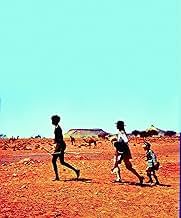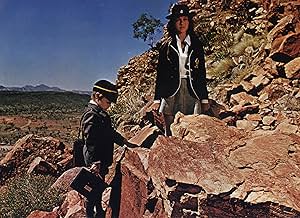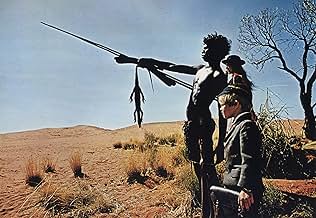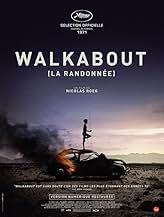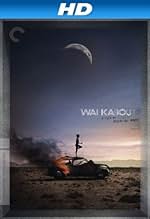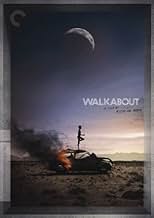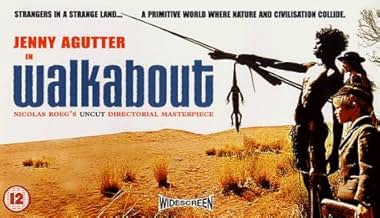CALIFICACIÓN DE IMDb
7.6/10
29 k
TU CALIFICACIÓN
Dos hermanos criados en la ciudad están varados en el interior de Australia, donde aprenden a sobrevivir con la ayuda de un niño aborigen.Dos hermanos criados en la ciudad están varados en el interior de Australia, donde aprenden a sobrevivir con la ayuda de un niño aborigen.Dos hermanos criados en la ciudad están varados en el interior de Australia, donde aprenden a sobrevivir con la ayuda de un niño aborigen.
- Dirección
- Guionistas
- Elenco
- Premios
- 1 premio ganado y 1 nominación en total
David Gulpilil
- Black Boy
- (as David Gumpilil)
Robert McDarra
- Man
- (as Robert McDara)
Peter Carver
- No Hoper
- (as Pete Carver)
Noeline Brown
- German Scientist
- (as Noelene Brown)
George Roubicek
- Radio Announcer
- (voz)
- (sin créditos)
- Dirección
- Guionistas
- Todo el elenco y el equipo
- Producción, taquilla y más en IMDbPro
Opiniones destacadas
I first remember seeing this film as a late teenager in about 1979. Therefore what most vividly stuck in my mind was the lead character played by a beautiful blonde English girl, Jenny Agutter, Specifically the nude scenes of her swimming and washing.
On a less superficial level it is a film with a point-something along the lines of the graciousness of Aborigines and their ability to live in harsh surrounds, and the destructive nature of suburban life in a flat in a major city.
I think it would be a film, like Jedda, that will always be on reference for the Australian Outback, Aboriginals and the modern society which brought a European civilisation to their land.
On a less superficial level it is a film with a point-something along the lines of the graciousness of Aborigines and their ability to live in harsh surrounds, and the destructive nature of suburban life in a flat in a major city.
I think it would be a film, like Jedda, that will always be on reference for the Australian Outback, Aboriginals and the modern society which brought a European civilisation to their land.
10Tophee
Superb cinematography, the Australian outback comes alive in this film of self discovery and regret. Agutter plays the English girl brilliantly, incapable of comprehending anybody or anything that doesn't conform to her middle-class values and upbringing. Roeg is also excellent as her brother, adapting to each and every change in circumstance as only children can. I have watched this movie many times, and always get something new from it. Highly recommended to anyone, although parents might want to watch it before letting their kids see it.
Although this is a sound film, and the characters talk to one another, this film could have been made just as well in the 1920s. It does not really need sound.
The film is about nature, and man's relationship with it. If a civilised person were left out in the desert, then they would soon die. But, as this film shows, there are people and creatures living out there quite happily.
The film has been criticised for having a weak beginning and a weak end. But where does the story of this film start? And where and when would you end it? Yes you can end it when the two children get back to civilisation. But does the story end there? No. Because of their experiences, things are never going to be the same again. And for them, the story has not finished, it is only just beginning.
I have seen this film several times and I notice something different every time I see it.
The film is about nature, and man's relationship with it. If a civilised person were left out in the desert, then they would soon die. But, as this film shows, there are people and creatures living out there quite happily.
The film has been criticised for having a weak beginning and a weak end. But where does the story of this film start? And where and when would you end it? Yes you can end it when the two children get back to civilisation. But does the story end there? No. Because of their experiences, things are never going to be the same again. And for them, the story has not finished, it is only just beginning.
I have seen this film several times and I notice something different every time I see it.
A remarkably potent little film about a couple of very proper English kids who get lost in the Australian outback and hitch up with an aborigine boy on his initiation quest (or "walkabout"). My mom took me to see it when I was ten, and I've been haunted by it ever since. With some understated yet disturbing themes of alienation and violence, as well as the first scenes of full nudity I had ever witnessed on screen, I've sometimes wondered whether mom knew what she was getting into when she took me along. According to the trailer in the letterbox edition, Parents' Magazine recommended the film "without reservation" for young and old alike, because it depicts "facts of life." While that may be true, times have changed, and I can't imagine anyone today describing this subtle and unsettling story as "family fare." Incredibly tame, on its face, by today's standards of sensory overload, its essential world-weariness and maturity is no longer a didactic priority in our age of overconfidence. Watching it recently, I was on guard for signs of the myth of the "noble savage"--the hackneyed, simplistic, and generally hypocritical pretension that pre-industrial and non-Western peoples are morally superior to decadent moderns, which is demeaning to both modern and "savage" alike. There are instances of it here--most notably when a couple of rifle-toting, four-wheeling hunters decimate the landscape--but the overall emphasis is on the parallels between aborigine and Western life. Even scenes of the transience and decay of modern civilization are mirrored by the life-and-death cycles of the wilderness. With so many underlying similarities, the real question is why the teenaged English girl cannot embrace, figuratively and literally, the young black man who has saved her life and provided so selflessly for her, even while her younger brother, in all his innocence, has never doubted that they are a family. Is it race? Culture? Or does it reach to more fundamental questions of boy and girl, man and woman, human and human? This film has held up remarkably well over the past 30 years, and is well worth a look.
In the late sixties and early seventies there was an unusual kind of excitement when you went to the movies. It probably had not happened since movies were first invented and has not happened since in commercial theatrical releases. This was the feeling of "I don't know what is going to happen next"! What happened one day was completely unexpected when I first saw the opening of "Walkabout". The introduction gave almost no clue as to what was to come next, but it was visually and aurally fascinating. The rapidity in which the plot shifted gears made you more sympathetic to the plight of our main characters. The sudden appearance of the Aborigine boy in the nick of time and his taking them under his wing. Then surprises of all surprises--our heroine does many nude scenes. Then her final look of yearning at the end suddenly explains it all. All the while Roeg is doing a travelogue of the Australian outback. This movie is pure genius from beginning to end. A must for any movie collection.
¿Sabías que…?
- TriviaLuc Roeg was actually sun-burnt in the scene where the aboriginal boy treats his back by rubbing him with fat from a wild boar. Director Nicolas Roeg thought it would make a good scene for the film so he picked up the camera and shot it.
- ErroresThe credits name the actor playing "Black Boy" as David Gumpilil. It should be David Gulpilil.
- Citas
Narrator: [last lines - from "Poem XL" by A.E. Housman's "A Shropshire Lad"] Into my heart an air that kills, From yon far country blows: What are those blue remembered hills, What spires, what farms are those? That is the land of lost content, I see it shining plain, The happy highways where I went, And cannot come again.
- Créditos curiososAfter the credits, there is a flash of white light on the screen and as it becomes a black screen, radio tuning is heard while the words "rien ne va plus" are shown.
- Versiones alternativasA director's cut of this movie was released in 1997 with 5 additional minutes. This cut is identical to the original British release version (100 minutes): the film was shortened by five minutes for its original American release.
- ConexionesEdited into Terror Nullius (2018)
- Bandas sonorasElectronic Dance
Written and performed by Billy Mitchell
Selecciones populares
Inicia sesión para calificar y agrega a la lista de videos para obtener recomendaciones personalizadas
- How long is Walkabout?Con tecnología de Alexa
Detalles
- Fecha de lanzamiento
- Países de origen
- Idiomas
- También se conoce como
- Walkabout
- Locaciones de filmación
- Productoras
- Ver más créditos de la compañía en IMDbPro
Taquilla
- Presupuesto
- AUD 1,000,000 (estimado)
- Total a nivel mundial
- USD 1,888
Contribuir a esta página
Sugiere una edición o agrega el contenido que falta


